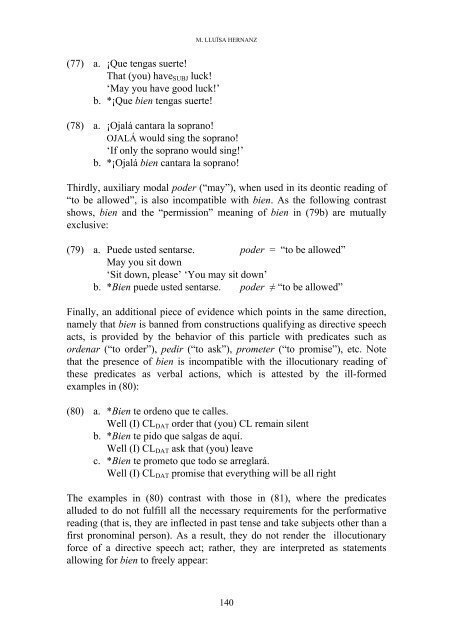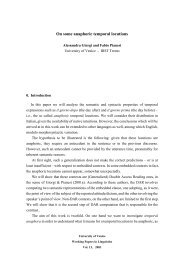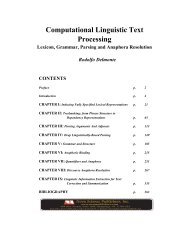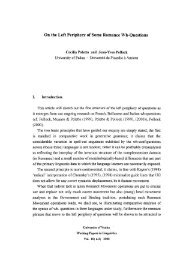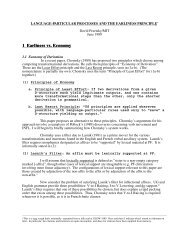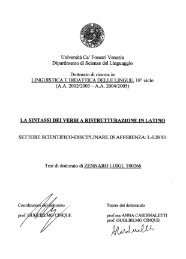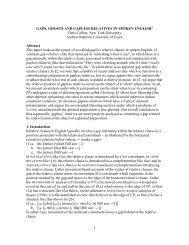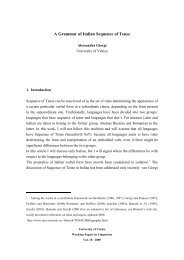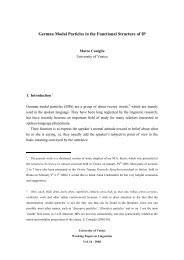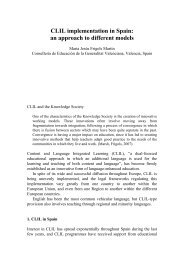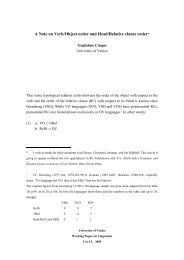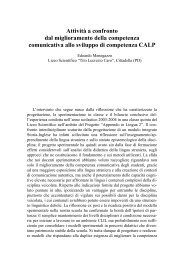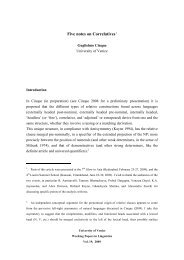Emphatic Polarity and C in Spanish - Lear
Emphatic Polarity and C in Spanish - Lear
Emphatic Polarity and C in Spanish - Lear
You also want an ePaper? Increase the reach of your titles
YUMPU automatically turns print PDFs into web optimized ePapers that Google loves.
(77) a. ¡Que tengas suerte!<br />
That (you) haveSUBJ luck!<br />
‘May you have good luck!’<br />
b. *¡Que bien tengas suerte!<br />
M. LLUÏSA HERNANZ<br />
(78) a. ¡Ojalá cantara la soprano!<br />
OJALÁ would s<strong>in</strong>g the soprano!<br />
‘If only the soprano would s<strong>in</strong>g!’<br />
b. *¡Ojalá bien cantara la soprano!<br />
Thirdly, auxiliary modal poder (“may”), when used <strong>in</strong> its deontic read<strong>in</strong>g of<br />
“to be allowed”, is also <strong>in</strong>compatible with bien. As the follow<strong>in</strong>g contrast<br />
shows, bien <strong>and</strong> the “permission” mean<strong>in</strong>g of bien <strong>in</strong> (79b) are mutually<br />
exclusive:<br />
(79) a. Puede usted sentarse. poder = “to be allowed”<br />
May you sit down<br />
‘Sit down, please’ ‘You may sit down’<br />
b. *Bien puede usted sentarse. poder ≠ “to be allowed”<br />
F<strong>in</strong>ally, an additional piece of evidence which po<strong>in</strong>ts <strong>in</strong> the same direction,<br />
namely that bien is banned from constructions qualify<strong>in</strong>g as directive speech<br />
acts, is provided by the behavior of this particle with predicates such as<br />
ordenar (“to order”), pedir (“to ask”), prometer (“to promise”), etc. Note<br />
that the presence of bien is <strong>in</strong>compatible with the illocutionary read<strong>in</strong>g of<br />
these predicates as verbal actions, which is attested by the ill-formed<br />
examples <strong>in</strong> (80):<br />
(80) a. *Bien te ordeno que te calles.<br />
Well (I) CLDAT order that (you) CL rema<strong>in</strong> silent<br />
b. *Bien te pido que salgas de aquí.<br />
Well (I) CLDAT ask that (you) leave<br />
c. *Bien te prometo que todo se arreglará.<br />
Well (I) CLDAT promise that everyth<strong>in</strong>g will be all right<br />
The examples <strong>in</strong> (80) contrast with those <strong>in</strong> (81), where the predicates<br />
alluded to do not fulfill all the necessary requirements for the performative<br />
read<strong>in</strong>g (that is, they are <strong>in</strong>flected <strong>in</strong> past tense <strong>and</strong> take subjects other than a<br />
first pronom<strong>in</strong>al person). As a result, they do not render the illocutionary<br />
force of a directive speech act; rather, they are <strong>in</strong>terpreted as statements<br />
allow<strong>in</strong>g for bien to freely appear:<br />
140


